Episodes
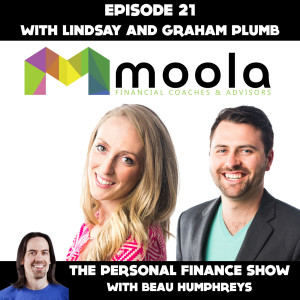
Thursday Mar 01, 2018
21 - Lindsay and Graham Plumb
Thursday Mar 01, 2018
Thursday Mar 01, 2018
Lindsay and Graham Plumb want you to be unstoppable with your personal finances.
If you’re 30 to 45 years old, for example, and you have a couple of kids, and a mortgage, maybe unstoppable is not the first word that comes to mind when you think of your finances. But this is actually the most important time of your life financially.
This is the time when tracking your spending, paying down your mortgage, having the right insurance and building up that emergency fund is crucial.
And then there’s the investing part - do you want to put some away for the kids’ education in an RESP account, and what about investing for retirement? Lindsay and Graham know how hard it is to wrap your head around all this stuff.
They were working in the traditional mutual fund and insurance business and realized there wasn’t a whole lot of holistic financial planning available. Holistic financial planning is when someone looks at your whole financial picture.
Do you have debt? Do you have existing investments that cost too much?
What are your goals around money? Do you want your kids to have a education fund or would you rather they take out loans themselves in the future and learn something in the process?
Do you have an emergency fund? Do you have insurance?
And when Lindsay and Graham tried to help clients with basic personal finance stuff like tracking and budgeting, the company they worked for told them: We don’t do that here.
How were they going to make you unstoppable, if all they were allowed to do was sell you products and then send you on your way?
This is the story of Lindsay and Graham Plumb and their company Moola Financial Coaches and Advisors.
NEXT EPISODE
22 - Richard Peddie
Click here to book a FREE 15-minute personal finance consultation with Beau Humphreys, Personal Finance Coach
Click here to become a patron of The Personal Finance Show via Patreon
To register for my next available personal finance webinar click here.
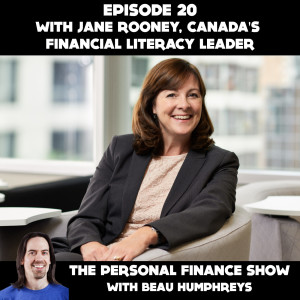
Friday Feb 23, 2018
20 - Jane Rooney
Friday Feb 23, 2018
Friday Feb 23, 2018
Did you know that Canada has a Financial Literacy Leader?
It's true.
Jane Rooney was appointed Canada's Financial Literacy Leader in 2014 within the Financial Consumer Agency of Canada (FCAC).
Yes, there is a government official whose main job is to make sure Canadians are financially literate.
Jane is awesome and she's joining me in the second half of this episode.
But first let’s talk about the only reason I even know Jane exists, and that’s because of the Conference Board of Canada.
Earlier this week, February 21st and 22nd, 2018, they hosted a conference called Financial Wellness and Retirement Readiness.
While preparing for the conference I found out the FCAC was a sponsor and they offered me an interview with Jane Rooney.
From the Conference Board I was offered an interview with their Vice-President of Industry, Strategy and Public Policy, Louis Thériault.
Louis gave a great presentation about the current state of financial wellness in the workplace.
After the presentation I sat down with Louis and asked him how he got into this world of economic and policy analysis.
As Louis says in the interview, there is a quadruple gain with financial wellness programs: The employee gets financial information and support to get out of financial trouble or to prevent them from getting into it in the first place; the employer benefits from less down time and more productivity; the insurers save money when overall health is improved; and, overall wellness is good for society as a whole.
So companies are making positive changes, what about the government?
When I started researching Jane Rooney for this interview, I was totally surprised by the commitment the government has made to strengthen the financial literacy of Canadians.
A common theme at the conference and in the discussion with Jane is the importance of overall wellness.
Whether you go through what I did and have mental health issues that caused addiction which led to financial problems, or whether you have unanticipated financial issues, which in turn may cause mental health issues, we now understand that one can’t be addressed without looking at the others.
And though we didn’t focus on it, physical wellness including healthy eating habits play a huge part in overall wellness as well.
I would like to thank Jane and Louis for taking the time to share their stories and insight. It’s comforting to know that there are people out there who are looking out for us and trying to improve the overall well-being of Canadians.
Here's the link to the FCAC hotline that Jane mentioned in the episode: https://www.canada.ca/en/financial-consumer-agency/corporate/contact-us.html
NEXT EPISODE
21 - Lindsay and Graham Plumb
Click here to book a FREE 15-minute personal finance consultation with Beau Humphreys, Personal Finance Coach
Click here to become a patron of The Personal Finance Show via Patreon
To register for my next available personal finance webinar click here.

Wednesday Feb 14, 2018
19 - Allison Suter
Wednesday Feb 14, 2018
Wednesday Feb 14, 2018
Allison Suter is a total tax nerd.
When someone mentions income taxes, do you get excited or are you filled with dread?
Do you wait until the last possible moment to file your taxes?
When you finally start the process, are you so on edge that if the slightest thing goes wrong you want to throw your laptop across the room?
And when it’s over, are you 100% sure that you messed it up somehow?
If this sounds like you, you should probably check out SimpleTax.
Allison Suter is a former tax lawyer.
One day she was doing her taxes online and started wondering: Why is preparing my tax return so complicated? Why is tax software so slow and expensive?
If a tax nerd like Allison thinks it’s complicated, what hope is there for the rest of us?
Luckily for us, Allison and her co-founders decided to build what they like to call “the best tax software in Canada”.
Allison joined me from Vancouver to talk about how she went from tax lawyer, to world traveller, to wedding photographer and finally to SimpleTax.
NEXT EPISODE
20 - Jane Rooney
Click here to book a FREE 15-minute personal finance consultation with Beau Humphreys, Personal Finance Coach
Click here to become a patron of The Personal Finance Show via Patreon
To register for my next available personal finance webinar click here.
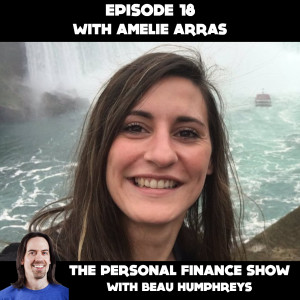
Thursday Feb 08, 2018
18 - Amélie Arras
Thursday Feb 08, 2018
Thursday Feb 08, 2018
For the Money 20/20 Payments Race in October 2017, Amélie Arras chose bitcoin as her method of payment and made her way from Toronto to Las Vegas in a week.
----
Imagine you’re visiting Europe for the first time.
For some reason you didn’t think to buy any Euros before you left home. You are Canadian, so all you have is Canadian dollars on you.
You find out that things have changed recently in Europe and there is no longer a way to exchange your Canadian dollars for Euros.
Your only option is to try to find businesses and people who will accept your Canadian dollars.
You’ll need food so you start by asking at various restaurants, and each one says, sorry, we don’t accept Canadian dollars.
You have internet access so you’re able to search for the Canadian community in the city you are in. You eventually find someone who agrees to take your Canadian dollars in exchange for some food and transport to your hotel.
But not every city in Europe will be like this.
Luckily you have some hotels pre-booked, but for most everything else you’re going to have to figure it out along the way.
This is what it’s like to travel with only Bitcoin.
---
Somehow, using only bitcoin, Amélie won the payments race.
Amélie joined me from the UK to tell her bitcoin story.
NEXT EPISODE
19 - Allison Suter
Click here to book a FREE 15-minute personal finance consultation with Beau Humphreys, Personal Finance Coach
Click here to become a patron of The Personal Finance Show via Patreon
To register for my next available personal finance webinar click here.
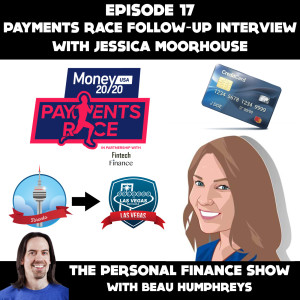
Thursday Feb 01, 2018
17 - Jessica Moorhouse (Payments Race)
Thursday Feb 01, 2018
Thursday Feb 01, 2018
Jessica Moorhouse travelled from Toronto to Las Vegas over one week using only a chip and pin credit card.
It’s October 2017 and I’m at the SIBOS global financial services conference in Toronto. I post something about the conference on Facebook and my friend Jessica Moorhouse comments that she’ll be at the conference tomorrow.
I had just found out that she would be participating in this payments race - think of it as the amazing race for money nerds.
It turned out the race was going to start the next day from the conference that I was already attending.
I was able to get an interview with all 5 contestants in the race, Jessica being the only Canadian.
All 5 racers had to make it from Toronto to Las Vegas in a week, using different methods of payment.
There was bitcoin, gold, contactless ring/apple pay, cash, and Jessica had to use a chip and pin credit card.
Maybe you’re thinking, that’s easy.
You can pay for everything with a chip and pin credit card in North America, right?
That’s what the race is all about.
The organizers didn’t do a trial run from Toronto to Vegas and try all of those methods to see if it was possible.
The race was created to find out if it is possible.
So Jessica and the other contestants headed out into the unknown to see whether it would be a breeze or if they would run into obstacles along the way.
Jessica joined me a few weeks after the race to tell her side of the story.
LINKS FROM EPISODE
If you want all the details about Jessica’s payments race journey, you can find them here:
https://jessicamoorhouse.com/youtube
https://jessicamoorhouse.com/survived-trip-across-america-using-chip-pin/
Personal finance bloggers who helped Jessica along the way:
Cait Flanders: https://caitflanders.com/
Michelle Jackson: https://michelleismoneyhungry.com/
Barry Choi: https://www.moneywehave.com/
NEXT EPISODE
18 - Amélie Arras
Click here to book a FREE 15-minute personal finance consultation with Beau Humphreys, Personal Finance Coach
Click here to become a patron of The Personal Finance Show via Patreon
To register for my next available personal finance webinar click here.
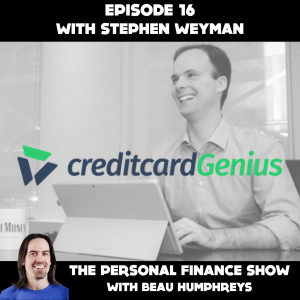
Tuesday Jan 23, 2018
16 - Stephen Weyman
Tuesday Jan 23, 2018
Tuesday Jan 23, 2018
Stephen Weyman knows a lot about credit cards.
---
In my opinion, credit cards should only be used in one way: I think you should only buy something with a credit card if that money is sitting in your bank account right now.
Credit cards are not for borrowing.
Please don't use credit cards for borrowing.
There are times in our lives when we need to borrow money. But credit cards are one of the worst tools for borrowing. The interest rate is way too high.
So just promise me that if you ever really need money, right now, and you're thinking about borrowing it with a credit card, look at other options first.
Maybe a loan or a line of credit with a lower rate.
Just look at other options and only borrow with a credit card as a last resort. Credit cards are a tool for convenience and benefits.
Now that you have agreed to only spend money you have in the bank, I can introduce you to Stephen Weyman and his new website called Credit Card Genius.
There are so many options when it comes to getting a credit card.
Before I talked to Stephen, I would have told you to never get a credit card with an annual fee.
You know I hate fees.
But what if the benefits you get when you use the card are much higher than the annual fee?
Example: Before I owned a car I rented cars all the time. Many credit cards come with collision and damage coverage if you book the rental car with the card. If you don't have a card with collision and damage coverage, the rental company will charge you $30 per day. That's an extra $210 on a rental for just a week. So if you rent a car for a week, even once a year, maybe a $99 annual fee on a credit card isn't so bad.
This is just one example of a credit card benefit. But there are so many that trying to remember them is making my brain hurt.
That's where Stephen and Credit Card Genius can help.
For over 7 years Stephen has been the mastermind behind the website HowToSaveMoney.ca. And while he included credit card reviews on HowToSaveMoney.ca, he realized the world of credit card selection was complex and needed its own space.
So Stephen found all of the credit card options in Canada and put them on one site.
Turns out there are more than 150 different options.
He even built some cool features to help you find the credit card that works best for you. Stephen joined me in downtown Toronto for my first outdoor and underground mobile episode of The Personal Finance Show.
(And a special shout out to Daniel Trezub from savewithdan.ca for making that cameo at the end.)
NEXT EPISODE
17 - Jessica Moorhouse (Payments Race)
Click here to book a FREE 15-minute personal finance consultation with Beau Humphreys, Personal Finance Coach
Click here to become a patron of The Personal Finance Show via Patreon
To register for my next available personal finance webinar click here.
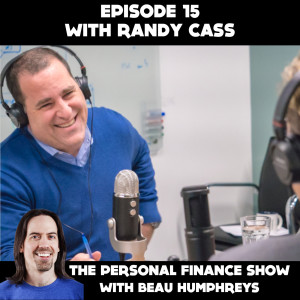
Sunday Jan 14, 2018
15 - Randy Cass
Sunday Jan 14, 2018
Sunday Jan 14, 2018
“Over a period of time it’s become incredibly difficult for any individual to stand in front of the data or the facts, and say that there is a defensible edge that I have in picking stocks, or creating strategies in this market that will outperform the passive indices.” - Randy Cass, NestWealth
Randy Cass is a professional investor.
After speaking to him for just a few minutes, it’s clear he knows investing. Randy spent years as an active portfolio manager making big money for big pension plans and institutions, managing their investment portfolios using complicated strategies that most people wouldn’t understand.
An active portfolio manager gets paid based on how well the portfolio does so it’s in their best interest to spend all their time coming up with the best ways to make money. Active portfolio managers work hard and it’s their full-time job, so people don’t mind paying them high management fees.
But what if you could get the same investment returns without paying the high management fees?
What if it turned out that there were passive investments, with very low management fees, that performed just as well as the high fee ones?
Over time, real data started to prove this was true. The high fees were good for the active managers but not for Canadian investors.
Randy eventually took a break from actively managing portfolios and became the host of BNN’s television show Market Sense. While at BNN conducting interviews and reporting on investment products, he realized that the majority of Canadians were still losing out on so much growth because of high fees, despite the fact that there were so many low fee options emerging.
Randy decided it was time to create a better way to help Canadians grow their money.
This is the story of Randy Cass and NestWealth.
To try Nest Wealth for yourself, click here: http://try.nestwealth.com/BeauHumphreys
NEXT EPISODE
16 - Stephen Weyman
Click here to book a FREE 15-minute personal finance consultation with Beau Humphreys, Personal Finance Coach
Click here to become a patron of The Personal Finance Show via Patreon
To register for my next available personal finance webinar click here.
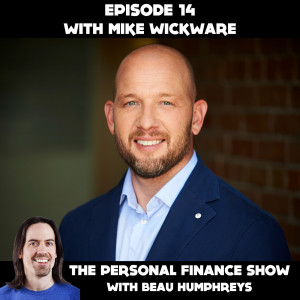
Wednesday Jan 10, 2018
14 - Mike Wickware
Wednesday Jan 10, 2018
Wednesday Jan 10, 2018
Mike Wickware started out having no idea what he wanted to do with his life and now he is Chief Marketing Officer of a company called Planswell.
Along the way, Mike had to make hard decisions about what was right for him and really think about what he wanted to do with his life.
There will always be people that tell you that you have to stay on a certain path because of safety and security or the fact that you spent money on a degree and you shouldn’t waste it.
Most of the time these people are well intentioned and they are just looking out for you. They don’t want you to get into trouble.
But the key thing to remember is that these people aren’t the ones living your life.
You have to do what’s right for you.
Even if people don’t understand.
Even if you end up somewhere you could have never predicted.
Are you one of the lucky ones who has always had a clear picture of what you wanted to do with your life?
There are many different names for this part of our life: job, career, work, what we do for a living.
Whatever you call it, it’s the thing - or things - that we do to make money.
The ideal situation is that the thing we do every day to make money is also something we enjoy, and that aligns with our core values. A core value is something that is important to you.
For example, one of my top 10 core values is helping others, so if I’m doing work and the end result of that work doesn’t help others in some way, I won’t be happy doing that work.
You might have heard someone say: what would you do with your life if money wasn’t important?
When you’re starting out in the working world, you don’t generally have that luxury, so you might take the job that pays you well enough for the skills you have at that moment in time. But most of the time, you don’t stay in that job for the rest of your life. Not anymore anyhow.
You might move up in a company, learn more about what you are good at, and eventually you might find out that you want to do something completely different. Some people think that when we change jobs, or follow our passions, we’re being selfish.
But to quote Esther Perel: It’s not vanity, it’s sheer survival of the soul.
If you are doing something everyday and that something doesn’t feel quite right, it is very important to listen to that feeling.
It doesn’t mean that you’ve been doing the wrong thing for the past 10 years, it just means that over that time you’ve learned more about yourself and what it is you truly want.
I believe that this is something that can only come from experience.
Mike invited me to the Planswell head office where he told his personal finance story.
NEXT EPISODE
15 - Randy Cass
Click here to book a FREE 15-minute personal finance consultation with Beau Humphreys, Personal Finance Coach
Click here to become a patron of The Personal Finance Show via Patreon
To register for my next available personal finance webinar click here.
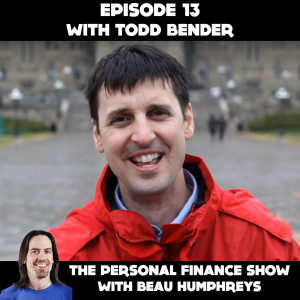
Thursday Dec 21, 2017
13 - Todd Bender
Thursday Dec 21, 2017
Thursday Dec 21, 2017
“Relationship builds trust, trust builds credibility, credibility builds influence. There are no shortcuts to that. There’s no app for that.” Todd Bender, Founder, CityKidz
Two weeks ago I got an email from J. Money and the team from Rockstar Finance. They had $100 to give to the first 20 personal finance bloggers to respond to the email, with the condition that the $100 would be used to give back locally and do some good.
The Rockstar Finance Community Fund is an amazing initiative that helps people do good in their community. Rockstar Finance has many personal finance bloggers on their list, so even though I thought I responded quickly, more than 100 others responded before me. I didn’t get the $100.
But then I thought: I like this idea. And: I have $100 of my own!
So I started looking for a local charity as I am a new Hamiltonian and didn’t already have one in mind. Google led me to CityKidz.
CityKidz has a Gift of Christmas campaign, where you can buy toys and drop them off at a Canadian Tire or local police station. Then I started reading more about CityKidz and realized there was much more to them than I thought.
Todd Bender founded CityKidz over 20 years ago and it has become a huge organization in Hamilton with branches in Ottawa and Regina. I decided I would visit the CityKidz headquarters, bring the toys I bought, get a tax receipt and see if Todd wouldn’t sit down with me to tell his story.
I talk about saving and investing and even spending your money, but I don’t talk as much as I should about giving away some of that money to those who might need it a bit more than you. The holidays are when we can all take a break from our daily lives, spend time with family and friends and reflect on what’s important to us.
It’s important to me that there is more giving in my life. Maybe not always money or things, but time as well. We all have skills and talents and we use them to make money, but they can also be given.
I’d like to thank J. Money and Rockstar Finance for inspiring me to put together this holiday giving episode and the last episode of 2017 where you will learn about Todd Bender and his amazing charity CityKidz.
NEXT EPISODE
14 - Mike Wickware
Click here to book a FREE 15-minute personal finance consultation with Beau Humphreys, Personal Finance Coach
Click here to become a patron of The Personal Finance Show via Patreon
To register for my next available personal finance webinar click here.
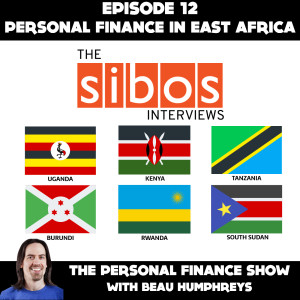
Thursday Dec 21, 2017
12 - Personal Finance in East Africa
Thursday Dec 21, 2017
Thursday Dec 21, 2017
“What we are looking for is partnerships, opportunities to learn, and collaborations to push forward the betterment of humanity.” - Richard Ndahiro of the United Nations Capital Development Fund
When I attend any conference, I’ve realized the most valuable part is the time that exists between scheduled activities. Mainly meals and breaks. This is generally when I meet the most amazing people and have the best conversations.
At the SIBOS 2017 conference in Toronto this past October, 8,000 delegates came from all over the world so I was definitely hoping to have great conversations with interesting people from different countries. I got to have many conversations over the 4 days of the conference but when I met a group of delegates from Uganda at my lunch table on day 2, I immediately knew they would be on my podcast.
Since my visit to Kenya last year I’ve been wanting to tell people about the state of personal finance in East Africa but my knowledge only scratches the surface. (When I say East Africa I mean the East African Community (EAC) of Kenya, Uganda, Tanzania, Rwanda, Burundi, and South Sudan.)
In Canada we take things like bank accounts, credit reports and credit scores for granted. We have credit cards and loans available to us from multiple sources. If we have talent, is it not hard to find the opportunity to use that talent to get a paying job or get funding for a business.
It isn’t that easy in East Africa.
THE INTERVIEW
My 3 guests on today’s episode are:
Richard Ndahiro, Digital Finance Expert for the United Nations Capital Development Fund or UNCDF
Ronald Azairwe, Director of Business Development for a Fintech company called Pegasus Technologies
Eric Kamau, Managing Director of a Fintech company called True African
Richard, Ronald and Eric have all made it their life’s work to improve the way that East Africans manage their finances.
Only 11% of East Africans have bank accounts. In contrast, according to the World Bank, 99% of Canadians have bank accounts.
Without a bank account, your cash is at risk, you can’t really prove you make any money, you don’t exist from a bank’s perspective, and you are unlikely to be able to get credit anywhere.
I am very happy that Richard, Ronald and Eric made the trip from Uganda to Toronto to join me in an inspiring conversation about bringing opportunity to those who need it most.
NEXT EPISODE
13 - Todd Bender
Click here to book a FREE 15-minute personal finance consultation with Beau Humphreys, Personal Finance Coach
Click here to become a patron of The Personal Finance Show via Patreon
To register for my next available personal finance webinar click here.
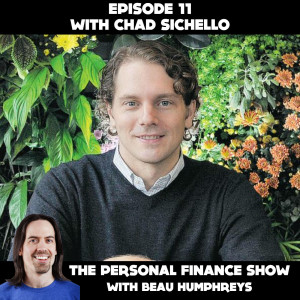
Thursday Dec 14, 2017
11 - Chad Sichello
Thursday Dec 14, 2017
Thursday Dec 14, 2017
"I'm thinking about building Lego right now Dad. Talk to me about compound interest later, ok?" - Chad Sichello
Who will teach our kids about personal finance?
In Canada, parents can open a bank account for their kids when they are really young. But at what point do you give them access to that money? At what point do they get a debit card?
These are decisions every parent has to make eventually. But it’s not enough to give them access to the $1,000 that’s in their account one day and say: “Remember to spend responsibly.” Or “Did you know that if you save just $1 a day, you could have $100,000 by the time you are 65?”
Do you know how far away 65 is for a 12 year old?
The point is that you may not be the best person to teach your kids about money.
With kids, it’s not always about how much you know about money, it’s about how you communicate with them. And it’s about how they learn and how they engage.
That’s where Dojo comes in.
Dojo is an interactive tool to teach your kids about money. It’s a smartphone app and debit card that are connected to your kid’s bank account.
Parents get a version of the app that has all the spending controls and monitoring abilities. The kid gets the version that tracks their spending, and let’s them work towards savings goals of their own.
You can add money to the kid’s account easily by using the app and even set up things like a scheduled allowance. As a parent you get to see where your kid spends their money and help them make better decisions, in real time.
I originally met Chad Sichello, CEO & Co-Founder of Dojo, at the Payments Canada Summit in May of 2017.
I really liked the idea and I started telling people about it, but I would say “It’s credit cards for kids!” and everyone thought I was crazy.
Well, of course, it’s not credit cards, it’s debit cards, which I suppose makes more sense since you can’t get a credit card in Canada until you are 18.
But no matter the product or the interface, what I liked the most was the idea of raising money-smart kids and that Chad and his team took the time to figure out how kids are learning today, and they created a product that met them, as Chad says in the interview, “where they are”.
I was happy to see that Dojo had a booth at the SIBOS 2017 conference in Toronto and I really enjoyed chatting with Chad about how he’s working to make sure the next generation is even better at managing money than we are.
As Chad mentions in the interview, Dojo is currently only available through ATB Financial in Alberta, so if you’re an ATB customer and have kids, please try it out and let me know what you think.
NEXT EPISODE
12 - Personal Finance in East Africa
Click here to book a FREE 15-minute personal finance consultation with Beau Humphreys, Personal Finance Coach
Click here to become a patron of The Personal Finance Show via Patreon
To register for my next available personal finance webinar click here.

Thursday Nov 30, 2017
10 - Canadian FinTech Corner at SIBOS
Thursday Nov 30, 2017
Thursday Nov 30, 2017
LENDING LOOP
I originally interviewed the co-founders of lending loop for Episode 2 of The Personal Finance Show so when I saw that they were setup at SIBOS in the Canadian Fintech corner, I knew that I wanted to include them in the Canadian FinTech Corner at SIBOS interview.
MYLO
Mylo is a smartphone app that is fairly new and currently only available on the iOS app store but they are working on an Android beta so stay tuned for that.
WAVE
Wave has been around since 2010. But they are recently new to me and they may be new to you, despite the fact that they currently have 2.8M customers worldwide.
Thanks to Cato Pastoll from Lending Loop, Liam Cheung from Mylo and Rob Maurin from Wave for taking the time to chat with me at the Canadian Fintech Corner at SIBOS 2017
NEXT EPISODE
11 - Chad Sichello
Click here to book a FREE 15-minute personal finance consultation with Beau Humphreys, Personal Finance Coach
Click here to become a patron of The Personal Finance Show via Patreon
To register for my next available personal finance webinar click here.
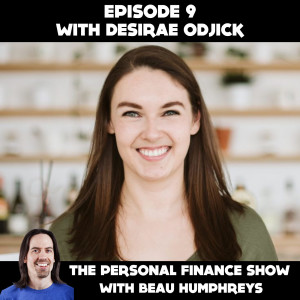
Friday Nov 17, 2017
09 - Desirae Odjick
Friday Nov 17, 2017
Friday Nov 17, 2017
“Being good at money doesn’t mean you have to give up the things that you love.” - Desirae Odjick
Desirae Odjick is very interested in helping you be great at money.
The best part is that she breaks it down in a way we can all understand.
This is sorely needed in the world of personal finance education.
Desirae originally started Half Banked because she ran the numbers and it turned out that she would have to save half her income to achieve all of her savings goals. And what better accountability than publishing updates on the internet along the way?
Two years later and now she’s the one giving the advice - because she’s been through it and learned a lot along the way. We all need a helping hand when it comes to meeting our financial goals.
There’s a reason why you’re good at engineering, or doctoring, or dentisting, or whatever it is you do to make money. It’s because you’re probably not super great when it comes to personal finance.
Well, Desirae is.
She can afford her dog(expensive!), her new house(expensive!!) and still meets her goal of saving 10% of her income before all that stuff (like living the life you want) gets in the way.
How? By paying attention. (a.k.a. budgeting and tracking)
A budget is a tool for freedom, not a prison.
The hard truth is: you can’t have everything. At least not all at once.
So if you put your priorities in a budget, you actually know if you can afford them or not.
I enjoyed chatting with Desirae at FinCon 2017 in Dallas, Texas (even though we’re both Canadian!).
NEXT EPISODE
10 - Canadian FinTech Corner at SIBOS
Click here to book a FREE 15-minute personal finance consultation with Beau Humphreys, Personal Finance Coach
Click here to become a patron of The Personal Finance Show via Patreon
To register for my next available personal finance webinar click here.
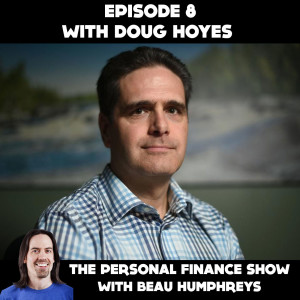
Tuesday Oct 31, 2017
08 - Doug Hoyes
Tuesday Oct 31, 2017
Tuesday Oct 31, 2017
“I would much rather come up with the right solution for you, rather than the solution that is going to make me money today.” - Doug Hoyes
This is the kind of thinking that makes me want to send everyone to Hoyes Michalos and Associates for help.
In 2009 I found myself with a huge amount of consumer debt, due to my gambling addiction, and I could barely keep up with my minimum payments. I could feel that I was on my way to finding a way out of my gambling addiction, but it was hard to make any progress with so much debt weighing upon me and no plan to pay it off.
I did a bunch of research and decided that filing for bankruptcy might be an option. I looked a bit further and found that a consumer proposal to my creditors might be the better choice.
In early 2009 I emailed Hoyes Michalos and Associates with the following message:
“Due to a recent gambling incident, my debt load has increased significantly. I do not believe I can reasonably afford to pay my current debt load. I think a consumer proposal might be the right thing for me.”
The “incident”, of course, was not recent, and it was an accumulation of gambling debt over 10 years, which I clarified with Sandra, the insolvency trustee when we met.
Sandra took my $40,000 in debt and crafted a proposal to my creditors asking if it could be reduced to $15,000. The alternative was bankruptcy, and $0, so my creditors accepted the $15,000.
I now had fixed monthly payments of $300 for the next 50 months. Oh yeah, and my credit rating would be ruined for the entire 50 months + 3 full years after my proposal was paid in full.
What might have been a negative for some, was a huge relief for me. With the inability to gamble with credit cards, and having enough cash flow to start saving again, I was able to focus on rebuilding.
Soon after, I finally realized I was gambling because I had Attention Deficit Disorder(ADD). I was diagnosed, medicated and my life changed completely.
It still took a few more years to shake the gambling addiction completely, but in 2011 I had my final relapse and was finally done with gambling.
In August 2012 I paid my proposal in full and 3 years later my proposal was cleared from my credit report. It took a while but I recovered from what seemed to be a hopeless situation.
This is the kind of situation Doug Hoyes sees every day.
After 20 years and 10,000 clients, Doug decided to write a book called “Straight Talk on Your Money”, just released in September 2017.
I really enjoyed speaking with Doug and I want to thank him for having me on his podcast “Debt Free in 30”. Here’s the link for that episode: https://www.hoyes.com/blog/dealing-with-gambling-debt/
To find out more about bankruptcies, consumer proposals, and other insolvency options, please head to https://www.hoyes.com or call 1-866-747-0660.
NEXT EPISODE
09 - Desirae Odjick
Click here to book a FREE 15-minute personal finance consultation with Beau Humphreys, Personal Finance Coach
Click here to become a patron of The Personal Finance Show via Patreon
To register for my next available personal finance webinar click here.
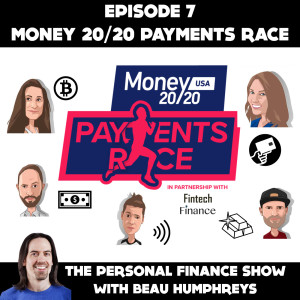
Wednesday Oct 18, 2017
07 - Money 20/20 Payments Race
Wednesday Oct 18, 2017
Wednesday Oct 18, 2017
On Wednesday, October 18, 2017, 5 contestants began the Money 20/20 Payments Race in Toronto, Ontario, Canada at the SIBOS conference.
Each contestant must use a different method of payment to get from Toronto to Las Vegas in 7 days, with checkpoints and challenges along the way.
Payment methods are: Chip and pin, Bitcoin, Gold, Cash and Coins, and Contactless.
It is only through a series of random connections that I became aware of this race.
One of the contestants, Jessica Moorhouse, is a friend of mine and host of the Mo’ Money Podcast.
She posted on social media about being the first Canadian to be selected to compete in the race.
Then I found out that the race was starting at the 3rd day of the SIBOS conference in Toronto - a conference that I just happened to be already attending!
So I tracked down the 5 contestants and chatted with all of them about the race, their assigned methods of payment, and how they were feeling at the beginning of this 7-day journey!
NEXT EPISODE
08 - Doug Hoyes
Click here to book a FREE 15-minute personal finance consultation with Beau Humphreys, Personal Finance Coach
Click here to become a patron of The Personal Finance Show via Patreon
To register for my next available personal finance webinar click here.
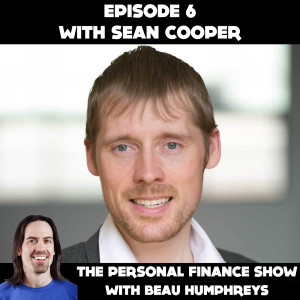
Monday Jul 17, 2017
06 - Sean Cooper
Monday Jul 17, 2017
Monday Jul 17, 2017
At age 30, Sean Cooper paid off the mortgage on his $425,000 home in Toronto.
He started with a hefty $170,000 down payment and then paid off his $255,000 mortgage in only 3 years.
Sean’s story is about goal setting.
You start with a goal and you take the steps necessary to achieve that goal. Sean’s goal was to own a house as early as possible.
So he saved every penny, worked several jobs, lived in the basement apartment of his own house so he could rent out the top, and lived a frugal life to achieve his goal.
You may not be able to duplicate what Sean did, and he doesn’t expect you to. He realizes his case is a bit extreme and not for everyone.
Sean wrote “Burn Your Mortgage” to help people pay off their mortgage sooner. Maybe not in 3 years, but how about 10 years instead of 20?
The point is that you don’t have to wait 25 years to own your house, just because your mortgage is amortized over 25 years.
If you really want to own your house sooner, you just have to make it a priority. Set the goal and work towards it.
“Burn Your Mortgage” is a great read for current homeowners and prospective buyers, but it also has some great tips for anyone trying to find ways to save more or earn more.
Sean’s critics love to tell him what he should have done instead of paying off his mortgage quickly. Maybe you don’t want to do what Sean did, and that’s ok. But Sean did it because he wanted to. No one forced him to work 3 jobs and live in the basement.
We all have the right to choose how we spend our lives. Sean wanted a house and now he has a house.
And now he has a house and a book.
Rather than judge Sean, I think we should congratulate him for his achievements and his amazing goal setting abilities.
NEXT EPISODE
07 - Money 20/20 Payments Race
Click here to book a FREE 15-minute personal finance consultation with Beau Humphreys, Personal Finance Coach
Click here to become a patron of The Personal Finance Show via Patreon
To register for my next available personal finance webinar click here.
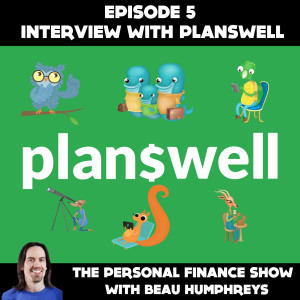
Wednesday Jun 07, 2017
05 - Planswell
Wednesday Jun 07, 2017
Wednesday Jun 07, 2017
When I first heard about Planswell, I joined their waiting list immediately.
Planswell is giving free financial plans to all Canadians.
This is what I’ve been looking for. Free budgeting and tracking from mint.com and now free financial plans. As I was doing research for the podcast interview and as I got to know the team better, I realized that Planswell is more than just a quick free financial plan.
It is definitely quick and free, but that first 4 minutes where you type in your info and a plan comes out - that’s just the beginning. Just like me with my personal finance coach clients, Planswell wants to help you over the long run.
The first plan is just the first plan. Every 6 months after that, you’re going to update that plan. Every 6 months for the next 40 or 50 years.
Planswell is not just about investing your money. The results of the plan depend on your personal financial situation. If you come to Planswell and you are in debt, the plan is going to have a debt repayment part to it. The plan may even tell you to put all of your available funds towards the debt and help you figure out how to do that. Planswell is not going to just take your money and invest it without knowing everything else about you.
This is called holistic financial planning.
This is what I want for everyone.
THE INTERVIEW
I had this idea to bring my mobile podcast studio to the new Planswell HQ and interview the whole team all at once.
I wasn’t sure if they would go for it but they did and I’m really happy with the results.
Having the whole team as part of the interview meant that it wasn’t just one person answering questions, but that anyone could grab the mic if they had something to say.
Most importantly, I got to try my segment “Questions from the Internet” with a large group of people and it was really fun. You can find the start of that segment around the 35 minute mark.
Overall I had the best time chatting with Planswell and I hope you enjoy the podcast!
NEXT EPISODE
06 - Sean Cooper
Click here to become a patron of The Personal Finance Show via Patreon
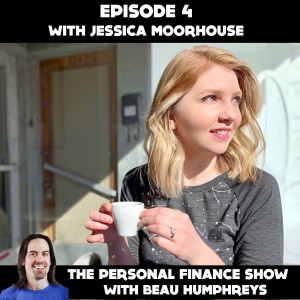
Thursday Jun 01, 2017
04 - Jessica Moorhouse
Thursday Jun 01, 2017
Thursday Jun 01, 2017
Jessica Moorhouse is a millennial personal finance expert, award-winning blogger, host of the Mo’ Money Podcast and founder of the Millennial Money Meetup.
Last year, after I met Jessica and told her my story about being addicted to gambling for 20 years and crawling my way out of debt and addiction, she immediately booked me on her podcast.
So it just seemed right that Jessica would be one of my first guests on The Personal Finance Show.
Jessica is currently on episode 109 of the Mo’ Money Podcast, and there are more on the way every week. In this interview we talk about how Jessica has embraced change in her life and how she has found success and happiness by doing so.
We also talk about mindfulness, travel, food, money personalities, and a million other things! I had a great time chatting with Jessica and I’m very excited that she agreed to participate in my first “Questions from the Internet” segment, which was so much fun.
NEXT EPISODE
05 - Planswell
Click here to book a FREE 15-minute personal finance consultation with Beau Humphreys, Personal Finance Coach
Click here to become a patron of The Personal Finance Show via Patreon
To register for my next available personal finance webinar click here.
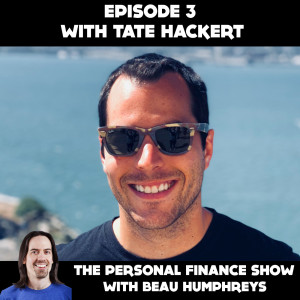
Tuesday May 23, 2017
03 - Tate Hackert
Tuesday May 23, 2017
Tuesday May 23, 2017
Tate Hackert wants you to have a better option for short-term cash flow needs.
Tate is in Toronto for the Payments Canada Summit from May 24-26 so I invited him to my studio to talk about ZayZoon and the 2nd annual FinTech Cup, which will be presented at the Summit.
I published a written interview with Tate back in January 2017 so if you want to know more about ZayZoon and Tate’s background, check out that post.
At the first Payments Canada Summit last year in Calgary, ZayZoon won the FinTech Cup and the $20,000 prize that went along with it.
NEXT EPISODE
04 - Jessica Moorhouse
Click here to book a FREE 15-minute personal finance consultation with Beau Humphreys, Personal Finance Coach
Click here to become a patron of The Personal Finance Show via Patreon
To register for my next available personal finance webinar click here.
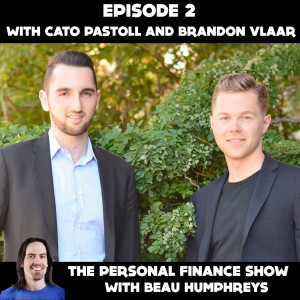
Thursday Apr 20, 2017
02 - Cato Pastoll and Brandon Vlaar
Thursday Apr 20, 2017
Thursday Apr 20, 2017
“Lending Loop is Canada's first fully regulated peer-to-peer lending platform focused on small business.”
That’s the official description from lendingloop.ca.
After interviewing co-founders, Cato Pastoll and Brandon Vlaar, I realized Lending Loop is also a way to connect Canadians.
On the surface it just seems like another investment option. You drop some money into an account and you choose how to allocate that money. There are a bunch of businesses, new ones show up every few days, and they have different risk ratings.
The prudent thing to do would be to spread your money to a few different companies with higher and lower ratings to balance your risk.
But it’s not just stocks and bonds that we’re talking about here.
These are real Canadian businesses.
Both Cato and Brandon grew up with parents who ran small businesses. They both know first-hand what it is like to go to a bank and be denied a loan.
And if the bank does approve a small business, it can take 60-90 days to get the loan, and piles of paperwork along with it. Lending Loop works with small businesses and connects them to Canadian investors like you and me. Everything is transparent - the company’s details and statements are online for you to look at.
You can even ask them questions via an online messaging platform!
Have you tried asking one of your stocks or exchange-traded funds questions? Yeah, it’s not that easy.
The whole team at Lending Loop is really focused on providing an alternative investment option that helps connect Canadians with other Canadians. Real people, not faceless corporations.
I really enjoyed visiting the Lending Loop office for this interview and I hope you enjoy it too.
NEXT EPISODE
3 - Tate Hackert
Click here to book a FREE 15-minute personal finance consultation with Beau Humphreys, Personal Finance Coach
Click here to become a patron of The Personal Finance Show via Patreon
To register for my next available personal finance webinar click here.
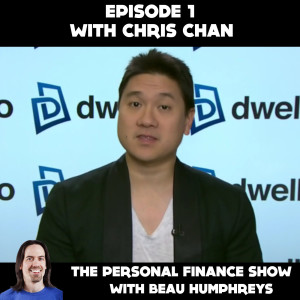
Thursday Mar 02, 2017
01 - Chris Chan
Thursday Mar 02, 2017
Thursday Mar 02, 2017
Sitting down to chat with Chris Chan of Dwello was like sitting down with Elon Musk of Tesla to talk about electric cars, and then finding out that it’s not about the cars at all, it’s about the batteries.
Batteries that are going to change the world.
Dwello is like Tesla, but for the world of rental payments and reporting.
Emphasis on the reporting part.
On the surface, Dwello makes it easier for tenants to pay landlords, and for landlords to manage their properties.
But beneath this really awesome concept, is an even more awesome concept which is going to revolutionize the way that Canadians think about credit reports and credit scores.
Please join me as I chat with Chris Chan, Managing Principal of Dwello, about how he’s helping Canadians pay rent, and ultimately improve their credit along the way.
NEXT EPISODE
2 - Cato Pastoll and Brandon Vlaar
Click here to book a FREE 15-minute personal finance consultation with Beau Humphreys, Personal Finance Coach
Click here to become a patron of The Personal Finance Show via Patreon
To register for my next available personal finance webinar click here.










